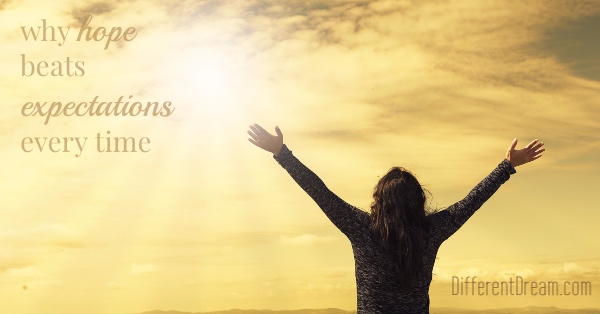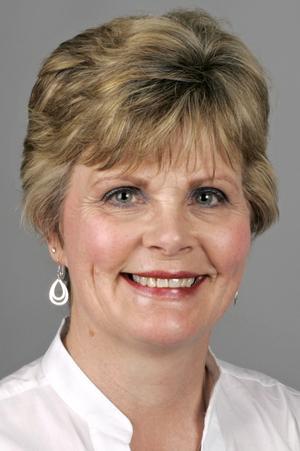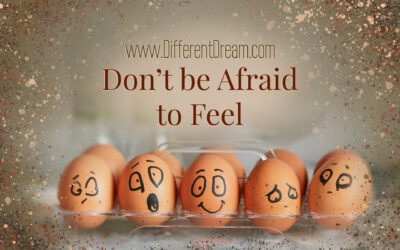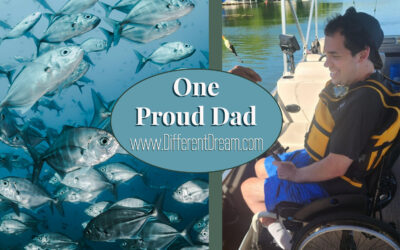The Difference Between Hope and Expectations for Caregivers

The difference between hope and expectation can be difficult for caregivers to distinguish. Guest blogger Kathy Guzzo shares what experience has taught her about how to tell the difference between them.
When it comes to a loved ones who’s struggling or impaired physically, emotionally or mentally, God can show caregivers the difference between hope and expectations. Expectations of what we want our loved ones to accomplish and how we want them to progress can easily lead to disappointment and despair. On the flip side, to hope is to feel that something will turn out for the best.
Hope gives us something to look forward to and will not lead to disappointment. (Romans 5:5 NLT)
This journey of learning the importance of hoping has been a long one for me. Our son was extremely ill as a toddler. At the age of 7 our daughter began having rapid seizures. Another daughter was diagnosed with a serious chronic illness at age 17. Now, one of our adult children suffers with mental health issues. My father has dementia. Each of these situations brought me down emotionally when I raised my expectations instead of my hopes.
Accepting and Building Hope
Through the daily struggles, tears, fears, the loss of dreams, and questions about the future, I have learned to guard my heart from the positive as well as negative expectations of friends, family, and medical professionals. Daily I must let go of the smallest of expectations. Because when an expectation isn’t met disappointment, pain, stress, frustrations, and sorrows take root in my heart.
God has shown me how hope can remain alive in the bleakest of circumstances. I don’t need to lower or raise my expectations. I need to build up my hope. Hope is a choice. There’ve been many days I haven’t felt hopeful. Without hope it’s easy to lose the drive to persevere through the tough stuff. Often I find myself searching for the smallest victory to get me through the large crisis.
When I begin to remove the expectations and hang on to hope, gratefulness for those small triumphs takes over my heart and mind.
Some days I feel lonely. When my heart becomes full of hopelessness and broken dreams, I need to remember I don’t have to fight alone. I need to accept that it’s okay to show weakness, to be overwhelmed, to need time away, or to have doubts and fears. Others may not always get what I’m struggling with, but their love, encouragement, support, and faith may be the fuel I need to grasp the lifeline of hope.
Hope isn’t a magic solution, making all the pain, frustrations, and questions go away. It is where joy begins and miracles can happen. It’s a confidence in faith giving us strength to persevere.
Jeremiah 29:11 states “I know the plans I have for you, says the Lord, plans to prosper you and not to harm you, plans to give you a hope and a future.” This promise that hope is always available is the reason, I’m choosing to build upon my hope and not upon my expectations.
Do you like what you see at DifferentDream.com? You can receive more great content by subscribing to the quarterly Different Dream newsletter and signing up for the daily RSS feed delivered to your email inbox. You can sign up for the first in the pop up box and the second at the bottom of this page.

By Kathy Guzzo
Kathy Guzzo and her husband live in Northern Illinois and have 4 adult children. She has a heart to minister to those in need of encouragement. Ten years ago her seventeen-year-old daughter was diagnosed with lupus and Epstein Barr Replication. Another daughter began struggling with depression and OCD in her mid-twenties. Kathy has learned that the role of a parent changes immensely as a chronically ill child becomes an adult. Kathy understands the need for her adult daughters to be able to make their own decisions regarding their health, but the nurturer in her sometimes has a hard time letting go. She desires to direct those with loved ones in the military as well as parents with adult chronically ill children to the peace and hope that God has abundantly available for them.
Subscribe for Updates from Jolene
Related Posts
God’s Power Is More than Sufficient to Answer our Prayers
Guest blogger Mark Arnold demonstrates that God’s power is more than sufficient to answer our prayers for our kids.
Emotions Are Information: A New Way to View and Interpret Big Feelings
Jolene explains the revelation she had about interpreting feelings as a special needs parent: emotions are information.
We’re Proud of our Kids with Special Needs!
Guest blogger Steve Harris takes a time out to remind us how true it is that we’re proud of our kids with special needs.






0 Comments